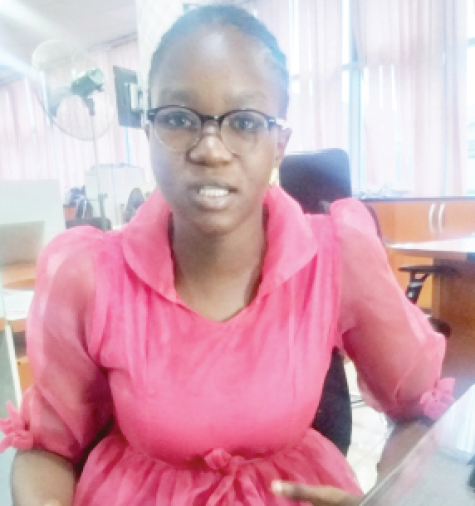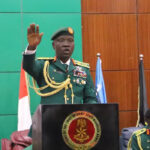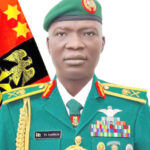Fifteen-year-old Splendour Joe King is a National Peace Ambassador, a human rights advocate for the National Human Rights Commission and the author of ‘Effects of Terrorism on Children’. She speaks on what inspired her to write the book and her dreams to make the voice of the children be heard.
Tell us briefly about your book ‘Effects of Terrorism on Children’
The Effects of Terrorism on Children is all about educating children on the dangers and effects of terrorism. Considering the general insecurity and happenings around our country, the children are mostly affected by these attacks. We, the children, are the ones that have been killed. We have been orphaned at a very young age and our desire to go to school has been destroyed.
- S’East PDP nominates Anyanwu as consensus candidate for National Secretary
- Senate queries Budget Office over N151.3bn extra-budgetary spending

In my book, there was an interview I had with a girl from an IDP camp which I visited when I was nine and her name was Zan. She was eight years old at that time. She told me that she couldn’t go back to school because of the Boko Haram attacks and that she is so afraid that she might get killed, kidnapped or molested on the way to school.
So, her desire to go to school was killed. That is why this book is a book that every child must have because when a terrorist comes and tries to use sweet talks to get a child to join his gang or terrorist group, they can say no. Even from peers, it also happens, so this book is must-have for every child.
What inspired you to write this book?
I was inspired to write the book because of the happenings around me and the fact that the terrorists we see today were once children like I was. If only they were properly educated on the dangers and effects of terrorism; they would not have ended up as terrorists. I have always said time and again that terrorism is no longer war of weapons and ammunition but it is actually a war of ideologies. And terrorism is like a virus which has killed many people more than cancer, HIV and all other killer diseases.
Aside this, have you authored any other book?
Yes, my sister and I have authored a lot of books together and I am still authoring other books and we also started a programme (The Extraordinary and the mind changing project). The extraordinary is a TV programme used to showcase positive things that we – young Nigerians – are doing to help our world positively. The children have often believed that the world celebrates negativity, so this programme will give them another view on how the world thinks and that they are also appreciated and will continue to contribute to the welfare of our country, Nigeria.
The mind changing project is a reformation project. My sister and I also believe that for someone to be completely healed from something, the reformation must start from within. That is why we started this project in an IDP camp. We introduced a drawing contest for them, so we can understand how they feel.
These children have gone through a lot. They have seen a lot of deaths, so it is quite right for us to start this project with them. We are still going to move to other people because it is all about changing the minds of how we individuals think about ourselves, the world and our country as a whole.
The experiences of these children, which they illustrated in their drawing, was painful but they are still optimistic of becoming something positive in the future.
Why are the Nigerian children calling for peace actually? It is because of the happenings around us and the insecurity ravaging our country and the fact that it is us the children that are mostly affected by these attacks.
Like I said earlier, we are ones that have lost our lives, we are the ones that have been displaced, we have been disfigured even when we had a form and then our desire to go to school again has been shattered because of fear of being attacked or kidnapped. That is exactly why we Nigerian children are calling for peace.
We want our elders, the governors, and the president to be part of this programme. And in this programme, we also want the president to flag off a campaign titled ‘educate a child’.
Lots of children wants to be part of this project but we the children can’t do this alone. We need support from our elders, governors and politicians. When they leave, we are the ones that are going to take care of this nation.
Tell me about your ambassadorial position and what do you do?
I am an ambassador and also a human rights advocate. I have been advocating from the age of nine, and I have been to different IDP camps.
The children are the grassroots solution to fight terrorism because there are lots of things that we the children see that adults will not be able to see and if we are given a chance to display or tell them what we see, then there won’t be any problem because we (the children) have always seen ourselves as bridge builders even in the family.
Apart from going to IDP camps, I have been soliciting and my sister has also joined me in this project.
What about the issue of sponsorship?
We (the children) need collaboration, especially in the programme we are about to do titled ‘the Nigerian children calling for peace’ and all other projects too. We can’t do this on our own.
How do you finance all these things you do?
From the little I get from the sales of our books, though it is still not enough to see our project move forward.
How will you describe the role your parents have played?
Their roles have been extremely amazing from the title of the book, especially ‘the effects of terrorism on children’ and my other projects. My mum, especially, has been a great support and she has been the one pushing me when I feel like quitting.
Whenever I feel like stopping because I am already feeling discouraged that nobody is helping me or wants to support me, she will say “No sweetheart, you can continue to do this. Don’t look at the present time, look at the future. Later on, people will appreciate the work you and your sister are doing. And they will understand that this project is not just for now, it is for the future.”
If you were opportune to meet the president, what would you tell him?
If I am to speak to the President today, I would love to tell him that we the children have been suffering. Of course, he knows that we are suffering. He should give us a platform, let our views be heard and let the president know that the children are involved.
What advice do you have for other children who want to do what you are doing?
Well, I will first tell them that the road is very hard and for you to be able to succeed, you have to be prepared. There is a saying that keeps ringing in my head ‘when the road gets tough, the tough gets going’. So, if these children can understand that, I don’t think they will have any problem. There is no road that you actually meet that you will not face challenge. No matter what, don’t give up on what you have already put your life into.
Can you talk about the challenges you are facing?
One of the challenges I’m facing now is lack of collaboration because we the children cannot do anything without our elders, especially the president and other well-meaning Nigerians. They need to support us in this project that we are about to carry out. Also, finance is another challenge.

 Join Daily Trust WhatsApp Community For Quick Access To News and Happenings Around You.
Join Daily Trust WhatsApp Community For Quick Access To News and Happenings Around You.


